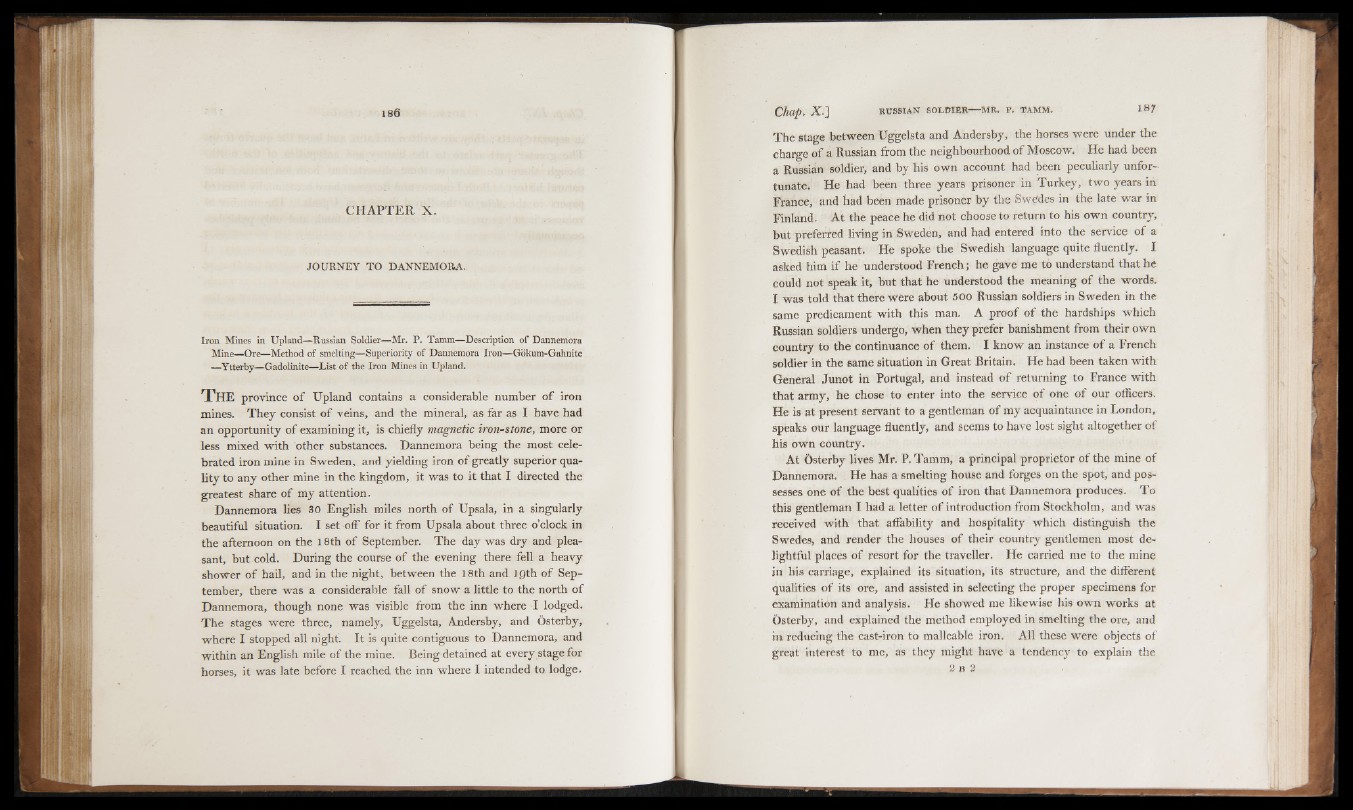
CH A P T E R X .
JOURNEY TO DANNEMORA.
Iron Mines in Upland—Russian Soldier—Mr. P. Tamm—Description of Dannemora
Mine—Ore—Method of smelting—Superiority of Dannemora Iron—Gokum-Gahnite .
—Ytterby—Gadolinite—List of the Iron Mines in Upland.
T h e province of Upland contains a considerable number o f iron
mines. They consist of veins, and the mineral, as far as I have had
an opportunity of examining it, is chiefly magnetic iron-stone, more or
less mixed with other substances. Dannemora being the most celebrated
iron mine in Sweden, and yielding iron o f greatly superior quality
to any other mine in the kingdom, it was to it that I directed the
greatest share o f my attention.
Dannemora lies 3 0 English miles north of Upsala, in a singularly
beautiful situation. I set off for it from Upsala about three o’clock in
the afternoon on the 1 8th of September. The day was dry and pleasant,
but cold. During the course of the evening there fell a heavy
shower o f hail, and in the night, between the 18 th and 10th o f September,
there was a considerable fall of snow a little to the north of
Dannemora, though none was visible from the inn where I lodged.
The stages were three, namely, Uggelsta, Andersby, and Osterby,
where I stopped all night. It is quite contiguous to Dannemora, and
within an English mile of the mine. Being detained at every stage for
horses, it was late before I reached the inn where I intended to lodge.
The stage between Uggelsta and Andersby, the horses were under the
charge o f a Russian from the neighbourhood o f Moscow. He had been
a Russian soldier, and by his own account had been peculiarly unfortunate.
He bad been three years prisoner in Turkey, two years in
France, and had been made prisoner by the Swedes in the late war in
Finland. A t the peace he did not choose to return to his own country,
but preferred living in Sweden, and had entered into the service o f a
Swedish peasant. He spoke the Swedish language quite fluently. I
asked him if he understood French ; he gave me to understand that he
could not speak it, but that he understood the meaning of the words.
I was told that there were about 5 0 0 Russian soldiers in Sweden in the
same predicament with this man. A proof of the hardships which
Russian soldiers undergo, when they prefer banishment from their own
country to the continuance o f them. I know an instance o f a French
soldier in the same situation in Great Britain. He had been taken with
General Junot in Portugal, and instead o f returning to France with
that army, he chose to enter into the service o f one o f our oflicers.
He is at present servant to a gentleman o f my acquaintance in London,
speaks our language fluently, and seems to have lost sight altogether of
his own country.
A t Osterby lives Mr. P. Tamm, a principal proprietor of the mine of
Dannemora. He has a smelting house and forges on the spot, and possesses
one o f the best qualities o f iron that Dannemora produces. To
this gentleman I had a letter o f introduction from Stockholm, and was
received with that affability and hospitality which distinguish the
Swedes, and render the houses o f their country gentlemen most delightful
places of resort for the traveller. He carried me to the mine
in his carriage, explained its situation, its structure, and the different
qualities o f its ore, and assisted in selecting the proper specimens for
examination and analysis. He showed me likewise his own works at
Osterby, and explained the method employed in smelting the ore, and
hr reducing the cast-iron to malleable iron. All these were objects of
great interest to me, as they might have a tendency to explain the
2 b 2